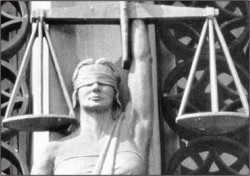Law watch
Justice is badly served when a judge sleeps during a trial
Barrister Harun ur Rashid
 A few weeks ago, an unusual case was heard at the Criminal Appellate Court in Australia, known as the “sleeping judge” trial. The lower court trial judge had a physical ailment that caused him to fall asleep for periods of up to 15 minutes during the trial. Because of Judge's status, the defence lawyer did not complain when this occurred.
A few weeks ago, an unusual case was heard at the Criminal Appellate Court in Australia, known as the “sleeping judge” trial. The lower court trial judge had a physical ailment that caused him to fall asleep for periods of up to 15 minutes during the trial. Because of Judge's status, the defence lawyer did not complain when this occurred.
On appeal, the Appellate Court upheld the verdict of the trial court. Part of the reason was that no complaint was made at the hearing and that one of the accused had written to the judge stating that he had a fair trial. One of the judges of the Appellate Court concluded:“ I am not , of course, suggesting that a sleeping judge can preside over a trial. I am saying that if a presiding judge sleeps from time to time, appellate intervention is only justified if it can be demonstrated that this resulted in error or deprived the accused of a fair trial in some respect.”
The statement of the judge of the Appellate Court raised a controversy among lawyers and ordinary people. Majority of people believe that if a judge sleeps at a trial even for 15 minutes, justice is not served.
Main issue
The main issue in this case is whether or not a fair trial can be heard if a judge is sleeping at time during the hearing. If a judge sleeps, there is usually a serious interruption in understanding what is being presented to the judge. Furthermore, a sleeping judge does not help the image of the justice system but rather brings it into disrepute.
A judge is required to be conscious at all times during the whole proceedings of the trial. If a judge falls asleep, he/she pays little attention to the evidence presented before the court. This has a direct impact on the fairness of the process. In a criminal trial, a judge is required to instruct the jury members in Australia to listen carefully to all the evidence and especially to his instructions.
How can instructions be followed and any respect be given to the judicial process when the judge himself is not in any kind of the state to listen? If a judge has physical, psychological or any other problems, the view is that the judge should not be on the bench but rather be given a leave and seek help for the problem.
In the US, under the due process clause of the country's Constitution a fair trial would not have taken place if a judge was sleeping during the trial and a new trial would be ordered. Sleeping judges have been disciplined for their behaviour in the US.
The “sleeping judge” trial highlights the gap between public perception as to what constitutes a fair trial and that of the Appellate Criminal Court. Many legal experts suggest that Australia needs better judicial procedures for disciplining judges who do not perform their judicial duties. And their highest court may revisit the case for miscarriage of justice.
The writer is Former Bangladesh Ambassador to the UN, Geneva.